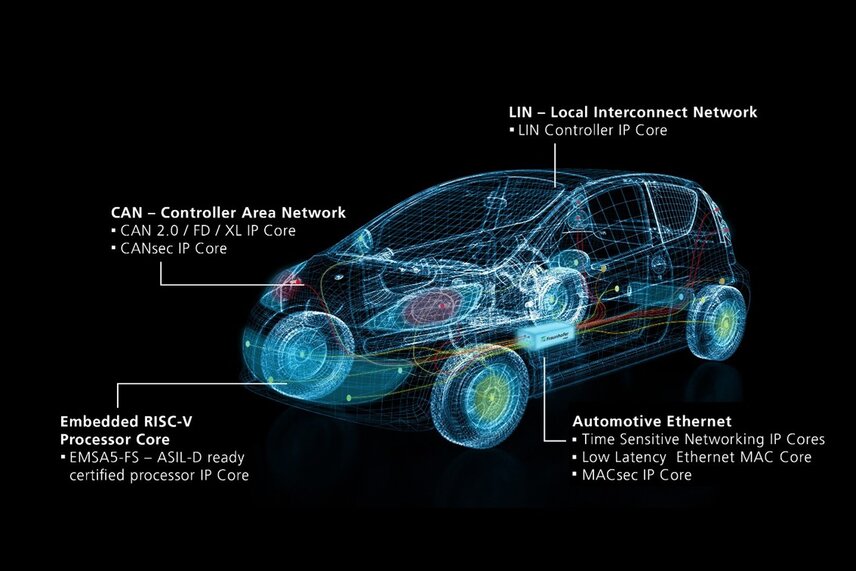
Um sich im Straßenverkehr autonom zu bewegen um Fahrende zu entlasten, sind die Fahrzeuge der Zukunft automatisiert und vernetzt. Dies erfordert neue Fahrzeugarchitekturen und hoch performante Komponenten. Das Fraunhofer IPMS arbeitet an verschiedenen Forschungsprojekten, um die Voraussetzungen dafür zu schaffen.
Das automatisierte vernetzte Fahren führt zu einem explosionsartigen Anstieg der Bandbreiten- und Rechenleistungsanforderung in Fahrzeugen. Um dem gerecht zu werden, spielen in der E/E-Architektur von Fahrzeugen zonale Anordnungen mit Zonen-Gateways und Zentralrechnern und der entsprechenden Vernetzung eine Schlüsselrolle. Ein weiteres Ziel dieser Architektur ist es die gewichtsintensive Verkabelung und die Anzahl der Steuergeräte im Fahrzeug zu verringern. Dafür ist ein Backbone im Fahrzeug nötig, dass den Anforderungen an Latenz, Quality of Service (QoS) und Bandbreite entspricht. Automotive Ethernet TSN verspricht eine Lösung für diese Herausforderungen zu sein.
"Die Entwicklung neuer Netzwerkarchitekturen und zugehöriger Komponenten, die den enormen Anforderungen an Rechenleistung, Bandbreite und Komplexität skalierbar gerecht werden, trägt entscheidend zur Zukunftsfähigkeit der deutschen Automobilindustrie bei", sagt Dr. Frank Deicke, Division Direktor Data Communication and Computing am Fraunhofer IPMS. "Das Fraunhofer IPMS unterstützt mit seiner Expertise in Automotive Ethernet TSN in verschiedenen Forschungsprojekten, in denen TSN-Komponenten für zukünftige Ansprüche entwickelt werden."
Im Projekt "Verano" liegt der Fokus auf der Entwicklung einer verteilten und effizienten Datenverarbeitung mittels KI-Methoden, die für Radarnetzwerke vollautomatisierter Fahrzeuge genutzt werden soll. Ziel ist die optimale Verteilung der Rechenlast und die Entwicklung eines KI-gesteuerten Radarsensornetzwerks anhand nachhaltiger Kommunikationstechnologien im Einklang mit den Zielen des Klimaschutzes. In einer Zonen-Architektur werden die Radarsensorknoten und Zonen-Gateways mittels Ethernet TSN mit den High-Performance Computern im Fahrzeug vernetzt.
Das Fraunhofer IPMS wird im Projekt neue Konzepte für anforderungsspezifische TSN-Netzwerke auf Basis bestehender TSN-IP-Cores mit Fokus auf Echtzeit, sehr geringer Latenz, geringem Jitter, Determinismus, hoher Datenraten (10GBit/s), Redundanz und funktionaler Sicherheit (ISO26262) entwickeln.
Im Forschungsprojekt "CECAS" wird eine Automotive-Supercomputing-Plattform für das automatisierte Fahren entwickelt. Das Konsortium entwirft dazu Prozessoren, Schnittstellen und Systemarchitekturen.
Das Fraunhofer IPMS trägt insbesondere im Bereich der Fahrzeugvernetzung zur Definition der Anforderungen an das Gesamtsystem bei und bringt seine Expertise im Bereich der Ethernet TSN Kommunikationsnetze ein. Das Institut entwirft und analysiert neue TSN-Vernetzungstechnologien mit Datenraten bis 50Gbit/s und entwickelt automotive Kommunikationscontroller für den Einsatz in ASIC & FPGA Systemen.
Mit Inkrafttreten der aktuellen Stufe des AI Acts müssen alle Unternehmen, die Künstliche Intelligenz benutzen, sicherstellen, dass ihre Teams über …
Das erste Chemnitzer Seminar des Jahres 2025 steht unter dem Titel »Test and Reliability Solutions – new opportunities for electronic …
Das Fraunhofer FEP beschäftigt sich bereits seit mehr als zehn Jahren mit der Prozessierung von Ultradünnglas, insbesondere dem Handling und …